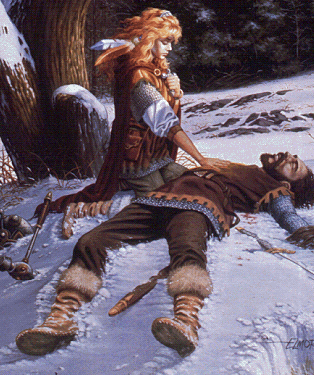
2. The cleric is the teacher of their God's or Gods' message in the mortal realm, and therefore wears and displays symbols which describe the God or Goddess.
3. The cleric of Honor serves life and will never allow a body to rot unless the dead adventurer intentionally wishes an audience with Lorminstra. In practical terms, this means always life keep first. This applies even if another cleric is in the room, and even if you will twitch by over-exertion as a result. Keep wolifrew lichen handy for such an event.
4. The cleric of Honor also opposes the undead, and supports any and all who wish to release the undead for any reason. As such, we are privileged to have the power to bless weapons and must never withhold that blessing. It goes without saying that charging for blessings is dishonorable.
5. A cleric of Honor shares his or her magical skills with others when resting in a place of safety. This does not require a cleric to deplete their spirit or mana for other peoples' purposes, but certainly includes spell requests for which another is willing to send mana. The sole exception is the replenishing of spirit to those who have the skill to drain themselves for power. The cleric of honor must look to their own God or Goddess for direction regarding such an act. The cleric should maintain their own magical readiness for battle against the threat of invasion at all times.
6. Often when the undead attack, they carry "rotting," "blackened", "twisted," or other such malformed weapons into battle. These items, and their shields and armors, are invariably cursed. When the creature is destroyed, their items remain on the ground as a bane to other adventurers who may pick them up and be rendered useless in the battle. The cleric of Honor is more concerned with the land and town's safety than pretty invasion souvenirs, and destroys these items on sight. A cleric has the power to destroy such items by blessing them. This is effective even if the weapon is in an adventurer's or a creature's right hand. Note that blessing a live invasion creature will destroy their cursed weapon, forcing them to swing a fist at you, and rendering them significantly weaker.
7. Raising the dead is an obligation and a privilege. The abandoned dead in the field must be brought to safety. The dead in safe areas must be raised. The cleric of honor does not stand by in either situation unless his or her own life is in imminent danger. It goes without saying that the power to raise comes from our God or Goddess and not from ourselves. Statements like "I will raise you now" are abhorrent, and should be replaced with "I will pray for you now," etc.
8. The cleric has an impressive power to turn the undead by repelling. However, this can be a nuisance to other hunters who are swinging limited blessings or casting finite reserves of mana at the creature they are battling in the next room over. If a cleric repels in a hunting ground, they should follow individual creatures until they have been dispatched. They should not be insulted if the creature they repel gets whacked by other adventurers, as they still learn in such an instance and it is hard in battle for other groups to shift attacks merely to be polite. Announce, "following this one", and repel again, in such a circumstance.
9. The cleric of Honor, when fogging or standing next to the dead, will always say clearly in guild speak that they are either with the dead or available to support other clerics in the room. It is not the honorable cleric's first concern to claim the right to pray for the resurrection, rather it is their concern that the dead be raised at all. Communication with our fellow clerics makes being a cleric a uniquely cooperative and enjoyable profession, even more so than healers.
10. Young clerics often make mistakes in etiquette, theology, and so on. It is the obligation of the cleric of Honor to teach young clerics as early as possible how our profession works. This includes the details of our magical spells, the differences between the various raise dead prayers, and hunting tactics. The young become the old, and we wish the old to be honorable to teach the next generation.
11. Many of our brethren have memorized on sight all the known clerics of raising age in the lands. This effort is rewarded by knowing on sight that the body at Voln, TSC, The River's Rest Sanctuary, The Pinefar Drawing Room, The Cavern of Ages, or North Gate (etc.) is already accompanied by clerics who are able to help. This allows the cleric who is speeding through on a mission to continue his or her work unchecked by the need to stop and cast life keep on all bodies lying on the healing node. However, if the clerics in the room are present in body only, and their minds are adrift in the ether, then the bodies that are dragged in may well require life keep, decay, and be lost to the demonic because other clerics assumed that the sleeping cleric was in fact awake. In such a case, it is the sleeping cleric who is most to blame. The cleric of honor's mere presence is a reassurance that all is well. To fall asleep in such a location would be misleading, and therefore dishonorable.
Lord Drandar Cholensale
Monk of Ronan
Master of Voln
Lord Paladin Emeritus of Onoir |
